|
|
|
Sort Order |
|
|
|
Items / Page
|
|
|
|
|
|
|
| Srl | Item |
| 1 |
ID:
166633
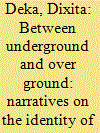

|
|
|
|
|
| Summary/Abstract |
The Assam Movement (1979–1985) has been a turning point in the politics of Assam in India that has raised the question of identity and at the same time triggered the struggle to self-determination by the insurgent organization United Liberation Front of Asom (ULFA). This paper aims to take identity as the point of departure to mark the transition of women’s role from the Assam Movement into their underground roles in ULFA. In such narratives of hero-making and patriotism, under-representation of women’s strategic involvement and self-sacrifices in the insurgent outfit often leaves the lives of the women members misrepresented and fails to highlight the in-betweens of life and death. This paper pushes the idea of identity assertion in Northeast India beyond citizenship and questions the way women’s presence in the insurgent organization gets narrated, documented, and established. Oral histories are crucial sources of data for this study.
|
|
|
|
|
|
|
|
|
|
|
|
|
|
|
|
| 2 |
ID:
166631
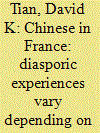

|
|
|
|
|
| Summary/Abstract |
The objective of this study is to identify the factors that contribute to the successful or unsuccessful integration of the Chinese diaspora in France. There is already a significant amount of literature that probes into the immigrant experiences of various other groups in France. However, the Chinese diaspora in France has remained insufficiently studied. This study aims to address this gap. The main findings of this study are that 1) unsurprisingly, the older the age of arrival, the less well integrated immigrants are in French society, 2) somewhat surprisingly, the less well integrated an immigrant is, the more likely he or she is going to believe that France is a tolerant and open-minded country, and 3) counterintuitively, the more deeply a member of the Chinese diaspora is immersed in French society, the more likely he or she is going to believe that France is hostile to people of Asian heritage.
|
|
|
|
|
|
|
|
|
|
|
|
|
|
|
|
| 3 |
ID:
166636
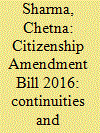

|
|
|
|
|
| Summary/Abstract |
This article is an attempt to unpack how the Citizenship Amendment Bill 2016 that proposed citizenship on the basis of religious affiliation trace its past from narrative rooted in partition and idea of religious identity in determination of citizenship status in India. The act proposes, persons belonging to minority community namely Hindus, Sikhs, Jains, Parsi and Christians from Afghanistan, Bangladesh and Pakistan who have either entered into India without valid travel documents or the validity of their documents have expired are eligible to apply for Indian citizenship by naturalisation in 7 years instead of existing 12 years. Building on existing scholarship, field experience and media reports this article argues proposed citizenship amendment bill that favours citizenship status for persecuted minorities defined primarily as Hindus leaving Muslims is not an attempt to redefine citizenship but reinforce logic that favours narrative of India for Hindus.
|
|
|
|
|
|
|
|
|
|
|
|
|
|
|
|
| 4 |
ID:
166638


|
|
|
|
|
| Summary/Abstract |
Cultural diversities, histories, communities and nations are intricately intertwined with experiencing old age. Individual and/or household culture, norms and expectations precede the decision-making process for health-seeking behaviour that influences elderly people’s choice and use of health-care services. This study addresses the understanding of this issue among migrant Bangladeshi elderly women from culturally and linguistically diverse background, residing in North 24 Parganas, West Bengal, India. Accordingly, data were collected through purposive sampling from 104 elderly women, all aged above 65. Processed data highlighted inconvenience – related to (language) pronunciation, socio-economic status, traditional health beliefs, understandings and practices, and reliance on alternative medical amenities.
|
|
|
|
|
|
|
|
|
|
|
|
|
|
|
|
| 5 |
ID:
166630


|
|
|
|
|
| Summary/Abstract |
Each ethnic enclave has its own idiosyncrasies, leading to disagreements as to the functions they serve for the migrants inhabiting them. However, three main functions may be identified across scholarly literature: shielding, economic and cultural. This article explores to what extent the spatial organization of the ethnic enclave is necessary for fulfilling these functions by taking the case of the Chinese international students in a Norwegian town. These students comprise a relatively cohesive group, and their conational social networks serve most of the same purposes of ethnic enclaves without the need for a separate neighbourhood. While most of their material needs are met, the students still express a lack of belonging, a need for a place that is ‘for us’, and they present an example of how an ethnic space is constructed without the need for a traditional ‘Chinatown’.
|
|
|
|
|
|
|
|
|
|
|
|
|
|
|
|
| 6 |
ID:
166629


|
|
|
|
|
| Summary/Abstract |
The history of modern Chinese schools in Singapore may be traced back to the early 20th century, when efforts to provide vernacular education in the British colony were made by community leaders across Chinese dialect groups, with support of the Qing Empire. Only a handful of these were selected as elite schools for bilingual education under the Special Assistance Plan (SAP) introduced in 1979 in independent Singapore. This paper examines the historical trajectories of these early schools from early association with Chinese nationalism to becoming multi-ethnic schools or simply defunct. It will focus on the case of the former Yeung Ching School in ‘Chinatown’ catering to the Cantonese community, to explore how the legacy of a Chinese school may be impacted by state formation and urban development since the 1950s, and also to point out a gap in current heritagisation pertaining to the role of education in shaping cultural identities.
|
|
|
|
|
|
|
|
|
|
|
|
|
|
|
|
| 7 |
ID:
166634
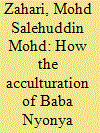

|
|
|
|
|
| Summary/Abstract |
The migration of the Chinese community to Malacca in the 16th century has enabled the process of cross culturing and culinary acculturation, producing a unique mixture of Baba Nyonya food. Even though Baba Nyonya food is pretty much has been localised (Malay), its Chinese representation cannot be denied. This study aims to assess how the acculturation of the Baba Nyonya community affects Malacca food identity. A quantitative methodology is employed in this study. This study classifies Baba Nyonya food acculturation through (1) types of food; (2) methods of cooking; (3) ingredients; and (4) eating decorum. From the regression analysis, this study found that Baba Nyonya cultural polarity explains significant variation in the formation of Malacca food identity. This study then elaborates on the importance of Baba Nyonya food in Malacca destination branding.
|
|
|
|
|
|
|
|
|
|
|
|
|
|
|
|
| 8 |
ID:
166635


|
|
|
|
|
| Summary/Abstract |
Kerala modernity and its widely acclaimed model of development, among other factors, is a result of radicalised civil society and protracted political action. The political actions of multiple actors such as social reform movements, communist movements, public theatre, people’s science movements, library and radical public policy played decisive role in this direction. In contrast to the two dominant conceptions of modernity – western capitalist modernity and eastern socialist modernity, which conceptualised that modernity is the result of industrialisation and centralised planning and development, respectively – modernity in Kerala was the result of political actions from below, which forced the state to adopt radical social and political reforms. These exceptionalities in Kerala modernity distinct itself from rest of the modernities in societies of the Global South.
|
|
|
|
|
|
|
|
|
|
|
|
|
|
|
|
| 9 |
ID:
166637
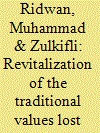

|
|
|
|
|
| Summary/Abstract |
The dynamics of modernization in Bataknese community, supported by various factors, led to the desacralization of traditions. This desacralization is due to the commodification of its cultural elements, among them the crafts of ulos. The existence of traditional ulos relates to religious life and is a manifestation of the Bataknese theology. The existence of Bataknese culture is strongly supported by the existence of ulos, which is the actualization of the ‘dalihan na tolu’ kinship system. Traditionally, the use of ulos in the community is governed by custom, according to the type, form, function and meaning. However, the commodification of ulos has caused inconsistencies in its development, so it is feared that this would obscure the values of tradition, which should be preserved. This paper discusses the revitalization efforts that can be conducted by the stakeholders of the craft of ulos: community, business, and government.
|
|
|
|
|
|
|
|
|
|
|
|
|
|
|
|
| 10 |
ID:
166632


|
|
|
|
|
| Summary/Abstract |
Ethnicity is a social construct that can be conceptualised as a social classification delineating certain boundaries between an ethnic group and the dominant group. Members of an ethnic group are assumed to share similar cultural characteristics and to be homogenous among themselves. Many studies in ethnic organisations have indicated that subethnicity also exists within an ethnic group, but research on subethnicity is scant. Based on the findings of an exploratory study conducted in Vancouver, Canada, we examined how, at an interpersonal level, place of origin, language, mutual bias and discrimination and transnational politics divide the Chinese diasporic community subethnically. Meanwhile, being Chinese in the Canadian context and willingness to break the subethnic boundaries are noted as counterforces to the subethnic divide. We contend that interpersonal interaction is an imperative dimension for the understanding of the shaping of boundary between different subethnic groups.
|
|
|
|
|
|
|
|
|
|
|
|
|
|
|
|
|
|
|
|
|